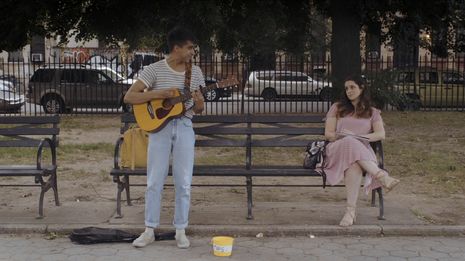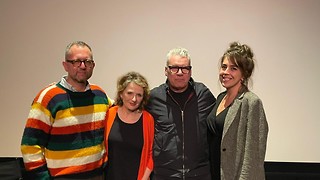Promising young women: in conversation with Lady Parts Productions
Olivia Townsend talks to the young talents behind a Brooklyn-based, all-female, all-queer filmmaking team

The women behind Lady Parts Productions seek to “make feminist films in every sense of the word”. Their quest to do so is part of a long tradition of filmmakers seeking to capture the nuances of everyday life on-screen. From the British ‘kitchen sink’ dramas of the 1950s and 1960s to the rise of ‘mumblecore’, those who now take up the task follow in the footsteps of many iconic directors and creatives. In this genre of realist cinema, the powerful voices of ‘angry young men’ have dominated in the past, but female perspectives are leading a new moment, or perhaps a movement, of narratives that challenge this orthodoxy. The act of carving out spaces for these narratives is typically credited to established filmmakers such as Greta Gerwig, but the groundwork is also, crucially, being laid by creatives like those at Lady Parts Productions. Based in Brooklyn, this all-female, all-queer group consists of Ali Edwards, Sophia Castuera and Mary Elizabeth Monda. Their work and ethos epitomises the spirit of this cinematic movement, and I’m slightly in awe as I sit down to chat with Sophia and Ali over Zoom.
The story of their formation is the stuff that indie films are made of. When Sophia overheard Mary Elizabeth on a phone call in a café talking about film production, she decided to be a “brave young woman” and go and introduce herself. The production company that grew out of this chance meeting in 2019, and its first feature endeavour, was a sort of “kismet”, Ali tells me: “we were in love with each other and in love with the project.” They shot their first film, august at twenty two in 17 days, using friends’ apartments for their sets and buying them beer as payment: “it’s like the mumblecore tradition,” they laugh. The trio all hailed from their own rich creative journeys, but shared the realisation that they wanted to create projects that made space for “underrepresented voices”. Using all-female crews, their work carves out a powerful space within the world of filmmaking. In Sophia’s words: “why not make that space for ourselves but also for other people?”
“Why not make that space for ourselves but also for other people?”
As writer and lead actor in august at twenty two, Ali transformed her own diary entries and life experiences as a young actor into the feature. It’s a messy and nuanced portrayal of a young queer woman navigating adulthood when college has ended and the rest of your life looms – I hear the echoes of Frances Ha, but I think that august at twenty two presents a greater sense of diversity in its characterisation. “I was missing seeing folks that are not cookie-cutter starring in their own stories,” Ali says – her portrayal of Cal, a recent grad trying to find her feet as an actor in New York, is a compelling answer to this call. Cal babysits on the side and goes to parties hosted by friends who are going on tour or getting law degrees – in Ali’s words, she is a character who “wants everything and has no idea how to get it … she’s floundering.” When she reconnects with a childhood friend and finds herself falling for his girlfriend, Cal becomes someone who is often “not able to make the right choices.” I didn’t judge her for it for a second – after all, as Ali puts it, “there’s a second puberty that happens when you’ve graduated college” and “you’re on your own” truly for the first time. Sophia tells me that she feels like she’s “gone through seven different coming of ages” already, even though she’s 29. This portrayal of early adulthood is raw and reverent, presenting characters who may not yet be fully-formed humans, but are certainly real ones.
“Queerness is at the centre of their projects”
Queerness is at the centre of their projects, though more as a matter-of-fact than a stand-out selling point. This normalisation of queerness is something the Lady Parts team seek to assert in their work; in a world where shows portraying sapphic storylines have a stunted life expectancy of one to two seasons at best, female queerness has not been as visible in film and TV as it should be. “Hollywood often likes to focus on the coming-out stories,” Sophia says, “as amazing as those stories are, they aren’t our stories at this point in our lives.” Cal’s queerness is not a grand narrative of struggle and self-acceptance, but rather “in this film being queer just is.”
“We treat it without explanation in a way that straight movies are automatically afforded,” I’m told. The filmmakers want to show queer people “just being messy, beautiful, funny, interesting people” and, in this film, they do so marvellously.
Where those “angry young men” may have once had their literary and cinematic moment, the ‘bright young things’ of today are creatives like those working at Lady Parts Productions. The power of the “female led, non-binary led stories with some sort of social justice anchor” that Lady Parts promote is undoubtedly more than a symptom of the moment – Sophia frames it as a “big north star”, and I’m as excited as they are to see more people start to follow it.
 News / Cambridge postgrad re-elected as City councillor4 May 2024
News / Cambridge postgrad re-elected as City councillor4 May 2024 News / Gender attainment gap to be excluded from Cambridge access report3 May 2024
News / Gender attainment gap to be excluded from Cambridge access report3 May 2024 News / Some supervisors’ effective pay rate £3 below living wage, new report finds5 May 2024
News / Some supervisors’ effective pay rate £3 below living wage, new report finds5 May 2024 News / Academics call for Cambridge to drop investigation into ‘race realist’ fellow2 May 2024
News / Academics call for Cambridge to drop investigation into ‘race realist’ fellow2 May 2024 Comment / Accepting black people into Cambridge is not an act of discrimination3 May 2024
Comment / Accepting black people into Cambridge is not an act of discrimination3 May 2024





